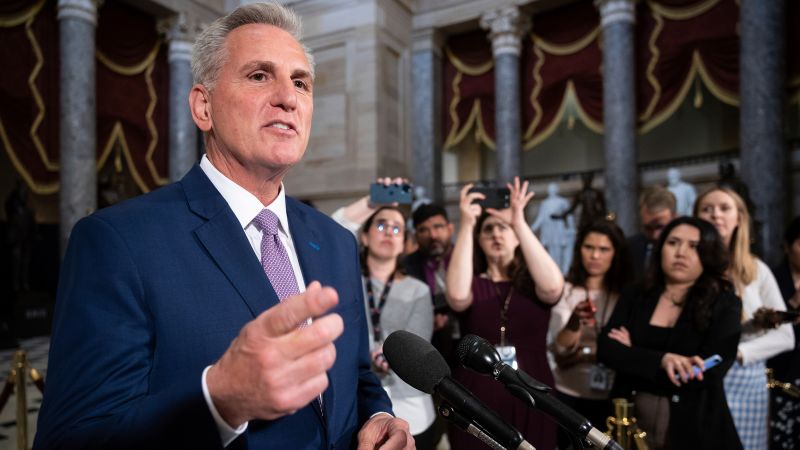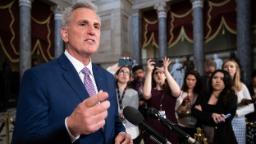

CNN
—
Speaker Kevin McCarthy passed his toughest test yet by buying off holdout Republicans and squeezing a bill with huge spending cuts through the House on Wednesday.
But the price of proving his authority with a radical GOP conference was pushing the nation closer to a debt default cliff edge in an increasingly alarming showdown with President Joe Biden.
The bill, which raises the debt ceiling for a year in return for spending cuts, was designed to hike pressure on Biden, who is refusing to accept Republican conditions that would effectively gut his domestic agenda. Unless the debt ceiling is lifted by the summer, the economy could crash.
The speaker, speaking with noticeable scorn for Biden, quickly seized on the narrow vote trying to blame the president for any subsequent debt default. “Now, the president can no longer put this economy in jeopardy. We have lifted the debt limit, we have done our job, we are the only body that passed anything,” McCarthy said.
But Biden, who launched his reelection campaign the day before, had previously made clear Wednesday that he wasn’t changing his position, saying that while he was willing to talk with McCarthy on longer-term fiscal issues, lifting the debt limit – a step only Congress can take – was “non-negotiable.” The White House insists that Republicans are holding the economy hostage and slashing programs that hurt the American people.
A failure to pass the measure would have further dented McCarthy’s speakership after a farcical 15 rounds of voting that the Californian needed to win his dream job in January. But after days of intense bargaining with rebel lawmakers, he proved he can at least wield his tiny majority and unify his conference after the measure passed 217-215. Four Republicans – the maximum number that could defect for the bill to pass – voted against the measure.
Effective congressional leaders often have to offer incentives to members of their party to build governing majorities on tough votes, and there’s nothing unusual about hurried rewrites of bills in the dead of night – as happened in the early hours of Wednesday.
But the major concessions on issues like midwestern ethanol subsidies, which the speaker made to win the vote, suggested that he is hardly a feared leader on his own side of the aisle. It sent the signal that holdout lawmakers can extract big giveaways in return for their votes. And McCarthy’s position as speaker, already weak after he offered multiple concessions to hardliners to win the gavel, was further eroded after GOP leaders ruled out any changes to the debt ceiling bill and then changed it.
This sets a daunting precedent in the debt ceiling standoff with Biden since Wednesday’s measure was purely a messaging bill that will never pass the Democratic-controlled Senate and will do nothing to solve the crisis. In the theoretical scenario that Biden and Senate Democrats agree to negotiate, any final bill would likely contain items that many Republicans would abhor, raising doubts about McCarthy’s capacity to pass critical legislation to save the economy in the teeth of a national crisis. All that happened on Wednesday is that Republicans passed a meaningless measure after tense days negotiating among themselves. And that bill only passed by a whisker.
There is nothing wrong with Republican lawmakers using mandates won in a democratic election to try to fulfill their pledges to cut government spending. But the question that many outsiders have, including on Wall Street, is whether the debt limit – an issue that could have disastrous consequences if things go wrong – represents a responsible area of leverage.
Unless Congress raises the government’s borrowing authority to pay for spending that it has already agreed to, the United States could default on its obligations, sending the economy into a spiral and a possible recession. The deadline could be as early as the first week of June. Millions of Americans could lose jobs or benefits or face higher borrowing costs. The fallout could sweep the world at a fragile economic moment and shatter the stellar reputation of the United States as a haven of financial stability.
Still, the political atmospherics did shift after McCarthy finally passed his bill, which among other measures, introduces tough new work requirements that could deter Medicaid applicants and takes aim at Biden’s bid to fight climate change.
The president must now decide whether he is sticking to his position that while he’s willing to talk to McCarthy about a budget, he will not agree to any concessions in return for raising the debt ceiling.
At his press conference on Wednesday before the vote, Biden stood firm.
“I’m happy to meet with McCarthy, but not on whether or not the debt limit gets extended. That’s not negotiable,” Biden said. “They quote Reagan all the time and they quote Trump, both of which said. … I’m paraphrasing – it would be an absolute crime to not extend the debt limit.”
But the president must consider whether the lessons of history still apply after previous showdowns in which Republicans suffered politically when they pushed the economy to the brink. The almost nihilistic extremism of some Trump-era GOP lawmakers suggests that they might be prepared to brave the political and economic devastation of a default to avoid caving to Biden, which their voters would see as a humiliation. In these circumstances, Biden will have to wrestle with the question of whether – despite all the political downsides of handing the GOP a win – the American people can stand the consequences of no resolution to this crisis.
A default-induced frenzy on stock markets and a potential recession would be a disaster for the president as he fights for reelection next year. But if Biden gives into Republican demands now, he will not only depress Democratic voters and squander some of his first-term legacy, he will establish a precedent that he can be browbeaten by radical Republicans wielding a nuclear option.
Both McCarthy and Biden are now locked in a high-stakes showdown that could effectively decide the fate of their political careers as each seeks to ensure that the other takes the blame in this game of brinkmanship.
The logic on the Republican side is that now that the House majority has passed a bill that raises the debt ceiling for a year in return for what the Congressional Budget Office says is $4.8 trillion in deficit reductions over 10 years, voters will think the GOP is the only party acting responsibly.
“Any president that refuses to negotiate does so at their own peril and to the detriment of the American economy,” one key McCarthy ally, Rep. Patrick McHenry of North Carolina, told CNN’s Manu Raju before the vote.
Yet there is no sign that Biden is willing to yield. And while the Republican approach may make sense from their point of view, it doesn’t consider the fact that the GOP holds power only in the House while the Senate and White House are in Democratic hands.
After several days in which it appeared McCarthy would fail to pass the bill, he began to move votes overnight. South Carolina Rep. Nancy Mace, who had said as late as Wednesday morning that she opposed the measure, emerged from a meeting with the speaker saying that she felt that she had been heard and ended up voting for it.
A source with knowledge of the discussion told CNN’s Raju that Mace will now draft a balanced budget amendment with McCarthy’s backing. Mace, who recently warned the GOP is alienating swing voters with tough anti-abortion stands, will also get floor votes on a bill related to women’s access to reproductive health and on a measure dealing with active shooter alerts.
A group of Republicans from Iowa and the Midwest, meanwhile, secured the removal from the initial text of a repeal of certain tax breaks for biofuels like ethanol. And leadership also agreed to allow proposed work requirements for Medicaid beneficiaries to be implemented on a quicker timetable. That cave was to secure the votes of GOP Rep. Matt Gaetz of Florida and several others. In the end, Gaetz, a vocal Trump ally, voted no anyway.
Leadership’s flexibility underscored the emphasis they were placing on the optics of GOP unity in passing a bill designed to jam Biden. And the speaker, flush with triumph after the vote, enjoyed publicly rebuking critics who had questioned whether he could pass it.
But his victory may be short lived. The drama on the House floor has done nothing to solve the looming debt ceiling crisis. In fact, it’s probably made it worse.
